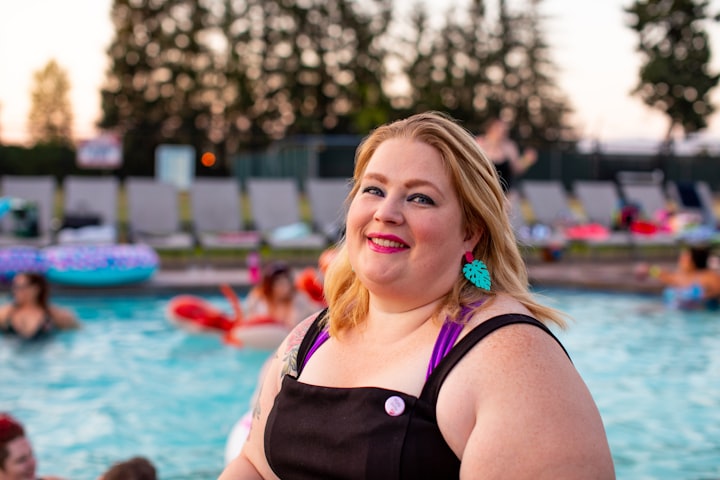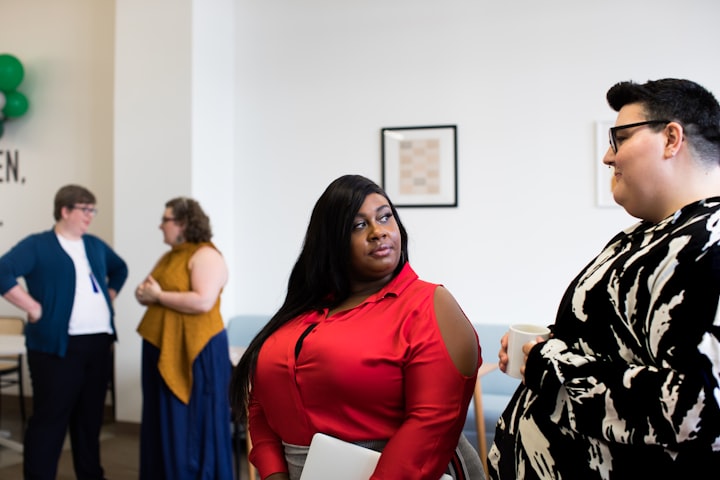So, You Got Fat: 8 Steps Towards Body Liberation
How to move forward and embrace your body just the way it is

It’s not easy to move from a life of embracing and buying in to diet culture to one where you appreciate your body for what it is. We live in a culture in which expectations are placed upon our bodies before we are even born (think gender reveals). Where my children’s BMI, an outdated and inaccurate gauge of health, has been printed on their pediatric after-visit summaries from the age of 2. Where my girlfriend, a dancer in a non-traditional dancer body, realized that the first time she looked at a photo of herself and thought she looked fat, she was only five years old.
We live in a culture in which expectations are placed upon our bodies before we are even born.
On my article, I Am a Fat Woman, and I’m Not Sorry About It, a commenter left a thoughtful comment about the battle they (and so many others) face in coming to terms with accepting their bodies. Here are eight steps I’ve taken to allow me to move towards body liberation, several of which use portions of that comment as a jumping off point.
Expect Recovery to Be Ongoing
Can I use you as a role model?
I love it when people look at me and see something to aspire to. It reminds me why I’m so outspoken about my body and bodies like mine. It’s hard to find the strength to move forward when you feel alone, and this conversation has gotten more common but it still isn’t where it needs to be.
The first thing to understand about body liberation, body acceptance, and fat acceptance is that it’s not a destination, it’s a journey. Much like any recovery, recovering from years of being immersed in diet culture is an ongoing process.
While I write articles about how I won’t apologize for my size, I also try to write about the times when I am struggling. The truth is, it takes a lot of work. Despite everything I know about how often intentional weight loss works (only 5% of the time), and everything I know about my specific body and what it’s capable of, I still feel jealous when a friend posts about having lost 50 pounds. Despite the fact that it’s not realistic or healthy to expect that of myself, there’s a part of me that still wishes I could do it.
Internalized shame is a horrible monster. I don’t feel shame about my body anymore. Sometimes, when I see a photo of myself, I notice that I look fatter than I feel. Sometimes it’s the opposite. Some days I look in the mirror and love the soft folds I see, and other days I just feel my body is in the way. But I’m working on loving it, always.
Realize You’ve Been Lied To
I have a question for you Rachel: it sounds like you’ve really gotten a handle on dealing with the issues of being fat when you’re a person who has always been fat and have no expectation of that really changing. That’s wonderful!
I was not fat as a kid. I started thinking I was fat when I went through puberty and my hips widened. When I was 15 I was in a size 12/14 pant, not because I had fat on me, but because that’s what fit my bone structure. As an adult, at my thinnest, I was 145 lbs and in a 14/16 pant, relegated to shopping in a “plus” section that was nowhere near what stores have available now.
I used to laugh this off. I’d say I can’t believe I thought I was fat then, look how small I was! Now it doesn’t seem so funny. It seems wasteful and insidious that I spent so much time being self-conscious and self-deprecating about something that wasn’t even true.
Realize that you have been fed lies for your entire life. You have been told that thinner is better, that fat is inherently unhealthy, that fat people are lazy, slovenly, gluttonous, and gross. That the worst thing that can happen to you is to be big. None of these things we’ve internalized are actually true.
The best way to combat lies is with truth. Diets don’t work. Bodies have different metabolisms. People can be naturally thin, but they can also be naturally not thin. Your size does not determine your worth.
Remember that Change is Inevitable
What can you say to people who have spent most of their lives “not-fat” and then find themselves facing this new reality? What if they’ve managed to lose some of the weight? (But we all know how effective diets really are in the long-term.) Can you help these people (me) come to terms with this new reality?
If there’s one thing I know about being human, it’s that change is not optional. Like it or not, we all have to go through it, all the time. Whether you have gotten fat, gotten less fat, or yo-yo’d back and forth, the first step towards happiness is accepting the changes.
Body changes are difficult. I still struggle with changes in mine. After I had a routine surgery in 2018, my stomach muscles were not the same. My belly, which I’ve carried and am used to finding at a certain altitude, had migrated south.
I felt my acceptance of my body, the thing I’ve worked so hard for, sliding.
I’m the same person, but the shift of an inch or two pushed monumentally into my self-confidence. Spring and summer bring frisky and flirty feelings for me, the desire to seek out new connections. Instead, I found myself feeling down about my body in a way I hadn’t in several years.
I’m still working on accepting those changes, the way my body feels when I am sitting is different, the way my pants fit is different. All of the work I’d done up to that point to be positive an accepting and appreciative of my body was done in my pre-surgery shape. It’s been a reminder that setbacks and change are inevitable, and that the work will never be 100% done.
Fat is Not a Feeling
I know that my weight gain has destroyed my self-esteem, my ability to work, my health, my libido, and really my ability to find joy in my life. When I look in the mirror I feel disgust and self-hatred, and I feel like I want to die. (I have chronic long-term depression with suicidal ideation, so this is no small thing or idle statement.)
Disclaimer: I am not a therapist or mental health care professional, and the things I’m saying are just my opinions based on my experiences and lay knowledge.
Your weight gain has affected your life in some ways that are real and tangible. If the weight you’ve gained has caused physical hardship, that is a tangible thing. There are likely things you can do to mitigate some of it, like strengthening targeted muscles to help your body be stronger. All of the things mentioned above could also potentially be divorced from weight.
Chronic depression can be extremely challenging. It sounds like depression and suicidal ideation have been a part of your life regardless of your weight. Talking to a professional who is willing to deal with working on both issues in tandem might be a good idea, especially in terms of forming realistic expectations about how accepting your body will or won’t affect your depression.
Consider whether your libido is low for physical reasons, or because you are depressed and feeling self-conscious. I have been fat for years, and experienced a complete loss of my libido during my marriage. Then I got out of it, and with the return of my mental health came the return of sexual desire. Sure, gaining weight can affect your hormone levels, but that’s something that can be addressed by finding a doctor willing to treat and diagnose issues regardless of weight.
Remember, fat is not a diagnosis. Health and weight are so often used as interchangeable in our culture, but they’re not. You can address the health issues you have and work towards body acceptance at the same time. What other factors might be contributing to your health issues? Make sure that your doctor is looking for root causes and not just blaming your fat. That’s a bad, non-evidence-based practice.
Fat is not a feeling. We, as a culture, need to disentangle the idea that there’s such a thing as feeling fat. Fat is not a way you feel, it’s a tangible thing. People say they feel fat when they mean all kinds of things: sad, bloated, unattractive, lazy, low-energy, etc. In order to become truly liberated in our bodies, we have to address all of the things that our society tells us we are because of our size. It is okay to be fat. You can still be happy, active, sexual, joyful, and healthy in a fat body.
Embrace Your Size With Your Wallet
No matter how wonderful and Utopian it would be if we all wore potato sacks and clothes didn’t matter, that’s not reality. We all have to wear clothes, ones we buy in stores. Shopping as a fat person has gotten easier since I was a teen. I remember distinctly how hard it was to find clothes in my size that looked appropriate for my age and not like something my grandmother would wear.
Now, there are stores like Torrid and Lane Bryant that cater solely to plus-sized customers. There are brands like Universal Standard, Elouqii, and Mod Cloth that sell clothes in sizes encompassing a range of bodies up to superfat and infinifat sizes.
Part of accepting change and embracing the body you live in is doing things to make your life in that body more comfortable and enjoyable. I buy clothes that fit me comfortably and make me feel good because they’re pretty. When something doesn’t fit me anymore, I get rid of it by donating it or offering it to a friend. I don’t wear shapewear because it’s not comfortable. I don’t “make it work” if I’m not comfortable. I dress the body I have in ways that are conducive to enjoying my life. Whether or not the current size of my body is permanent, I deserve to feel comfortable and happy in this moment, right now.
Acknowledge Your Trauma
A friend was visiting from out of town and secretly took some pictures of me just doing ordinary stuff. He thought they were great pictures and wanted to post them online; when he showed them to me I burst into tears and when he mentioned posting them I damn near went hysterical; it was a week before I could leave the house and let other people see me. I felt so ashamed. I’ve never felt that kind of shame before. I know that our mother used shame to try and get my sister to lose weight, I never thought that I internalized it by osmosis.
I’m not at all surprised that you were affected by the things your mother said to your sister. We are all products of our environment, and even if you were not the direct target of her words, you were absorbing them like a sponge. We are all products of our environments. Even if your mother had only directed her body-negative words at herself, it still would have affected the way you grew and developed to perceive bodies in this world.
This all takes undoing. It takes conscious, concerted effort to rebuild something that has been broken down, especially in cases like yours where it came from someone who was supposed to care for you and build you up. It may take a professional, or at the very least seeking out online support groups, to heal the trauma you have faced.
One of the best things for me in terms of acknowledging the damage and trauma of the messages I’ve been given is replacing them with positive ones. I follow a lot of fat positive and body lib folks on social media. I listen to podcasts and read books by people who look like I do and have faced the same struggles. I do everything I can to normalize different types, shapes, and sizes of bodies.
Decouple Your Body from Your Worth
The size of your body does not have moral value. The fact that you have fat on your body doesn’t make you any more or less valuable than anyone else. The idea that thinner is better is a lie that society tells us. We have been fed the idea that everyone has an “ideal” weight, that if we do not meet it, we must not be ideal.
Food also does not have moral value. There is no such thing as “good food” and “bad food.” Describing foods as healthy and unhealthy does nothing but create a false binary to a richly complex world of nutrition, mental health, and biology, and body chemistry. You are not bad if you have dessert or don’t eat a salad.
There are 1,000 things that make you who you are, that make you beautiful and worthy and unique and human. Your fat? It’s one thing about you. It’s not everything or the only thing. Think about all the things in life that make you happy. Is trying to lose weight one? Is being skinny one? I vividly remember the realization that I don’t feel better about myself when I’m thinner. I just feel smaller.
Actively Work to Dismantle Diet Culture
Body acceptance is an active process. It won’t work unless you put effort into it. While it isn’t easy or quick, it’s absolutely worth it. I may still be fat, but the amount of weight I lost by not carrying around diet culture’s load of complete BS every day is immeasurable.
I do this in multiple ways. I write about it. I think about it. I talk about it with my friends. I have learned to recognize when I see something that is perpetuating diet culture and an unhealthy and unnecessary focus on body shape and size. I comment on Facebook posts and ads that perpetuate harmful ideals. When my friends talk negatively about their bodies, or fat bodies, I speak up.
I take a lot of selfies. I look at myself in the mirror. I touch my body, and don’t avoid my fat. I let other people touch my body. I look at the photos I take, more than once. Sometimes I don’t like how they look, but one thing we are taught is not to be proud or to look at ourselves or show ourselves if we don’t look perfect. Last year, I posted pictures of myself in my bathing suit because I deserve to share my beach days too. I speak out loud about all of these things because I need to hear it said out loud, but also because other people do.
Your Body is Part of Who You Are
My journey to body acceptance was perhaps unconventional and definitely not for everyone. I started to understand the worth of my body regardless of the scale through discovering my sexuality and spending time in unconventional but truly body positive spaces. I wish there was some magic piece of advice I could offer you about how to be more accepting.
The best advice I have is that you are worthy. You deserve love, acceptance, and happiness. Your body is a vessel, and it’s part of who you are, but it doesn’t define you. If this all seems like a whole lot to take in, take it one step and one day at a time. Habit builds habit, and it will get easier. I am not unique, I’ve just put in the work and pushed back. You can too.
About the Creator
Rachael Hope
Polyamorous, loud laughing unapologetic feminist, rad fatty, and epic sweet tooth. I might overshare, but I'll also share my fries and shake with you.






Comments
There are no comments for this story
Be the first to respond and start the conversation.